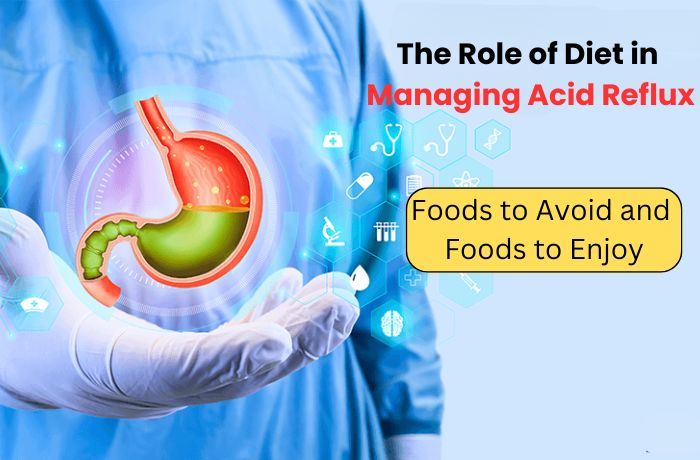
- June 17, 2024
The Role of Diet in Managing Acid Reflux: Foods to Avoid and Foods to Enjoy
Acid reflux, also known as gastroesophageal reflux disease (GERD), is a common condition in which stomach acid backs up into the esophagus, causing discomfort and potential damage. Managing acid reflux often requires lifestyle changes, especially in diet. If you’re struggling with GERD, Dr. Suresh Jain offers expert treatment options to help you find relief. Understanding the role of diet in managing acid reflux can significantly improve your symptoms and quality of life.
Understanding Acid Reflux
Acid reflux occurs when the lower esophageal sphincter (LES) doesn’t work properly, allowing stomach acid to leak up into the esophagus. This can cause symptoms such as heartburn, chest pain, and regurgitation. Long-term acid reflux can lead to more serious problems such as esophagitis or Barrett’s esophagus.
The Importance of Diet in Managing Acid Reflux
Diet plays an important role in the treatment of acid reflux. Certain foods can worsen symptoms by increasing stomach acid production or relaxing the LES. However, other foods can help calm the digestive system and reduce acid reflux episodes.
Foods to Avoid for Acid Reflux Management
Avoiding certain foods is essential to managing acid reflux. Here are some common ones:
1. Spicy foods: Spicy foods, such as chili peppers and hot sauces, can irritate the lining of the esophagus and make acid reflux symptoms worse.
2. Acidic foods: Citrus fruits (such as oranges and lemons), tomatoes, and their derivatives (such as tomato sauce) are highly acidic and can irritate the esophagus.
3. High-fat foods: Fried foods, fatty meats, and full-fat dairy products can relax the LES and delay gastric emptying, worsening acid reflux symptoms.
4. Caffeinated and carbonated drinks: Coffee, tea, soda, and energy drinks can stimulate acid production and weaken the LES, leading to reflux.
5. Alcohol: Beer, wine, and spirits can increase stomach acid production and relax the LES, causing acid reflux episodes.
Foods to Enjoy for Acid Reflux Management
Including calming and low-acid foods in your diet can help manage acid reflux symptoms. Here are some beneficial choices:
1. Vegetables: Most vegetables are low in fat and sugar, making them excellent choices. Examples include broccoli, green beans, and cucumbers.
2. Non-citrus fruits: Fruits such as bananas, melons, apples, and pears are less likely to cause reflux.
3. Lean proteins: Chicken, turkey, and fish are good sources of protein that are less likely to cause reflux than fatty meats.
4. Whole grains: Oatmeal, whole wheat bread, and brown rice are high in fiber and can help absorb stomach acid.
5. Ginger: Ginger has natural anti-inflammatory properties and can help relieve gastrointestinal irritation.
6. Herbal Teas: Herbal teas, particularly those containing chamomile or licorice root, can soothe the digestive system.
Tips for Eating Habits
- Portion control: Smaller, more frequent meals can reduce pressure on the LES and decrease reflux episodes.
- Meal timing: Avoid eating large meals just before bedtime to allow for adequate digestion before lying down.
- Eating Pace: Chew food thoroughly and eat slowly to aid digestion and minimize reflux symptoms.
- Post-meal habits: Wait at least two to three hours after eating before lying down or exercising.
Seeking Professional Help: Dr. Suresh Jain for GERD Treatment in Pune
While diet changes can significantly reduce acid reflux symptoms, it’s important to consult a specialist for complete treatment. Dr. Suresh Jain is a leading expert in GERD treatment in Pune. With extensive experience and a patient-centered approach, Dr. Jain offers treatment plans that address the root causes of GERD and provide long-term relief.
Conclusion :
Managing acid reflux means understanding which foods to avoid and which foods to include in your diet. By making mindful dietary choices and seeking professional treatment from experts like Dr. Suresh Jain in Pune, you can effectively control your GERD symptoms and improve your quality of life. Remember that while dietary changes can make a significant difference, consultation with a doctor is crucial for total acid reflux management.
